|
Ojai, California
In 1947 Alan Harkness and colleagues formed the High Valley
Theatre Workshop in the Ojai valley in California. The valley was a
haven for artists, writers, musicians and those in search of
spiritual refuge in a time of chaos. Krishnamurti lived there for
many years, founding a high school with Aldous Huxley and others.
A brochure for the school expresses its aims as
follows;
The aim of The High Valley Theatre is to be a
workshop wherre actors may be fully trained, and a theatre where
significant plays, old and new, may be prepared and sent on
tour, with the actors receiving this necessary experience before
audiences. The training ground is to be a home to which the
actors may return and further develop and deepen the work.
The method of training is based on the
approach of the Chekhov Theatre Studio, whereby a thorough
training of voice and body for dramatic expression, as well as
the actor's own inner creativeness is developed.
Some Important Aspects of the Training:
-
Imagination of a role, inner and outer
characteristics and their incorporation.
-
Approach to technique through
psychological gesture, objective and
justification.
-
The five Greek Gymnastics which form a basis
for many aspects of dramatic expression.
-
Deepening the experience of speech
through studies based on Rudolf Steiner's method of
Speech Formation and Eurythmy.
-
Fencing.
-
Dancing.
-
The application of all points of approach to
dramatic sketches and improvisations,
where problems of atmosphere, ensemble,
rhythm, dramatic form and style are
exercised.
Lectures will be given on theatre history,
evolution of the drama and past and present trends.
Performances: A large part of the training
will consist of public appearances in plays which have been
prepared in the workshop. This will provide opportunity for
practical experience in makeup, and in the preparation of
costumes, scenery and lighting for the
stage.
***
Notes about the aim in our Performances
(from the notebooks of Alan Harkness)
To transform the everyday body so that it may move as the
expression of soul and spirit.
To transform the everyday
speech so that the sounds and rhythms of poetry become vocal and
inevitable
A word has its gesture
A movement has
its sound
A true drama has its form which is gesture -
movement sound - word.
There are studies which lead to
these inner dynamics. When achieved in a performance they make a
strong impression on an audience, even if it does not understand
the actual language of the speech. The deeper levels of the
human being are touched, not only of the head - understanding
and sentiment. With such means one can more faithfully reveal
the human tragi-comedy; awaken the emotions of the audience and
in the Aristotelian sense bring harmony into these
emotions.
We believe that the sustenance given to the
audience psyche by such a performance is of especial value in
our age when so much coarsens and deadens it.
Various
techniques are being worked at to create this expressive
rhythmical theatre and the response of audiences in Italy,
Germany, Switzerland and Paris are encouraging - school children
are particularly enthusiastic; but above all our aims are to
move to tears and laughter; to invoke by the magic of theatre
the unsuspected angels and even demons; and by the sympathetic
participation of the audience to bring about a transformation of
human nature. If only one could achieve it and if one dared say
it: -
the theatre as an act of redemption.
This it certainly was at its
greatest and can become so again today.
***
Notes for an article on The High
Valley Theatre production of Uncle Vanya
- Alan Harkness
As it is with any work of art, different people have
different interpretations of the play, Uncle Vanya. It is
in interesting for those of us actively at work on a production
of the play, here in Ojai, to read the New York critics on the
current Old Vic presentation of the piece, and to note the local
response here to the play. Stark Young, one of the few cultured
and perceptive drama critics writing in New York, defends the
play but criticises the lack of complete faith and mutual
response in the acting of the English company. Of course reality
and ensemble playing were especially developed by the Moscow Art
Theatre where the Chekhov plays were first produced, and the
plays are unthinkable without this weaving life. In reply to the
criticism of 'gloom' he write: "Uncle Vanya
is not gloomy; nothing so intense and inwardly alive could be
dismissed as gloomy. It would also be called by Chekhov with his
sensitive, observant, doctor's mind, a comedy."
Our presentation of the play must seem justified and stand
or fall according to its ability to move and enthral an
audience, and convey the special revelation of art. However a
few words as to our view of the play, and our aims in producing
it may be of interest.
To begin with, we feel privileged
to work on Uncle Vanya in order to exercise out theatre
craft. The plays of Chekhov with their psychological naturalism,
the weaving of atmospheres and the subtly drawn characters
demand a truthful and fine means of expression. Also, The High
Valley Theatre has a small nucleus of actors who wish to work
hard in an endeavour to create performances of excellence. From
this group, Uncle Vanya could be well cast.
All
the Chekhov plays show us that dark period 1890-1904; the
fin-de-siecle, in middle class Russian life. Happily, that epoch
is over, but in all parts of the world people are still living
through the frustrations, hopes and boredoms of the Vanya
characters. Very few have progressed beyond this. Outer technics
have diverted the attention from within to gadgets and jittery
mechanical amusements so that the soul is stunned; but those
sensitive and courageous enough to look within will see with a
certain humour and horror what Chekhov reveals. And here is one
of the educational values in presenting the play: the
objectifying of the feeling soul life. How few languid beauties
are willing to look within, as does Yelena, and admit: "But
as for me - I am a tiresome, futile person .... In music and in
my husband's house and in all love affairs... When I come to
think of it Sonya, I am very, very unhappy! There is no
happiness for me in this world! None!"
But Chekhov
is not all dejection. The Russian has abundant, vivid life and
humour, and, although he has great difficulty in establishing
any human balance between excesses of exaltation and despair, he
has a religious belief in a future transformed humanity.
Tolstoy, Dostoyevsky, Chekhov and Gorki all give expression to
this. I do not believe this is a wishful thinking born out of
dreadful social conditions, but a deep presentiment of a future
development which may stem from this difficult but wonderful
people.
In Uncle Vanya this belief is shown through
the country doctor, Astrov, who is aware of this meanness of the
contemporary life and of his own deadening feelings, and yet
plants forests for a future race. Regarded as a crank by his
contemporaries for his ideals and his refusal to eat meat, he is
surely a portrayal of the country doctor Anton Chekhov himself.
The last act is a remarkable texture of evening atmosphere and
frustrated lives, with the bells of departing carriages jingling
out into the night, carrying away the loved ones. But the play
ends with a striking scene of belief in the future. Out of a
broken heart, Sonya speaks to the sad Vanya words that glow with
belief, while 'Waffles' strums a guitar.
Two
catastrophic wars have shaken the world since Anton Chekhov
wrote. People at all awake to the times are facing deeper
abysses and seeking further illumination than the diagnosis and
artistry of the doctor-writer could reveal. But as social
history, Uncle Vanya shows us a dark epoch that is over
and that had no answer or solution for the suffering humanity
which Chekhov lays bare with acute sharpness and tender humour.
As theatre, the play awakens fear and compassion and in the
Aristotelian sense leads to a catharsis, also revealing that
which art alone can reveal.
High Valley Theatre - in rehearsal
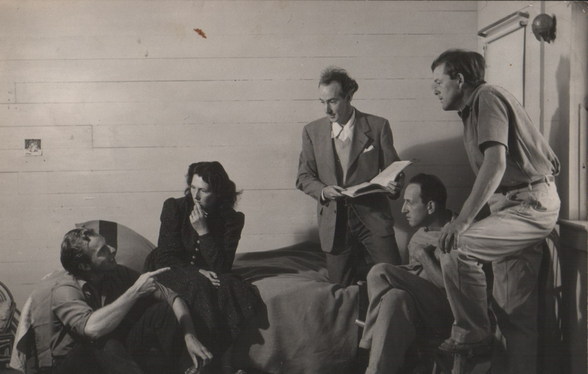 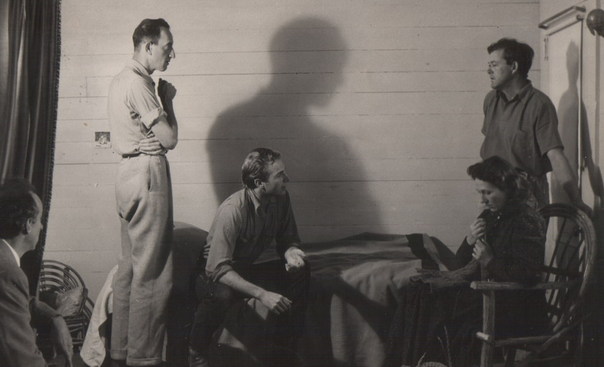 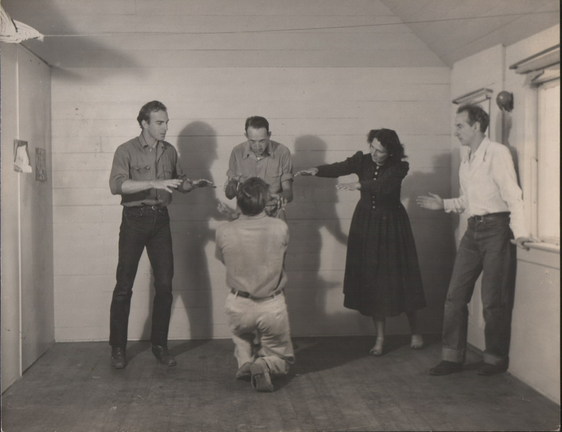 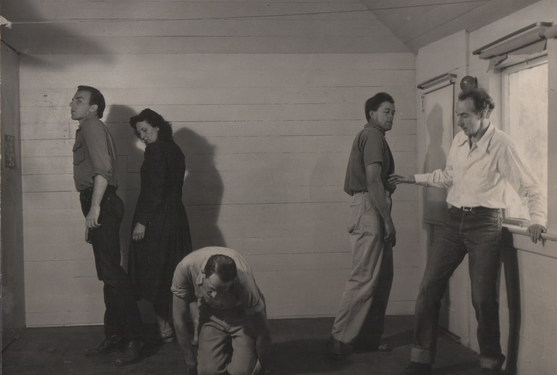 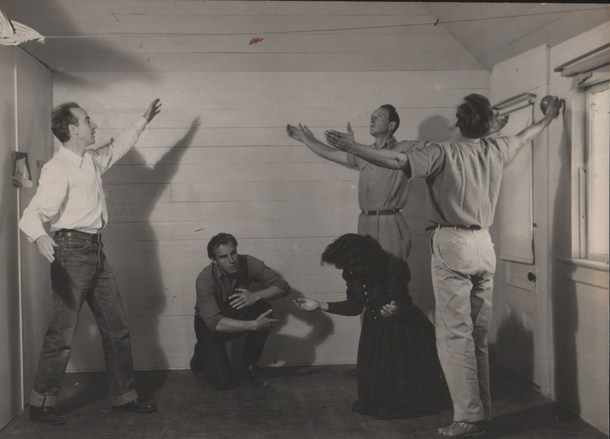
***
|
|